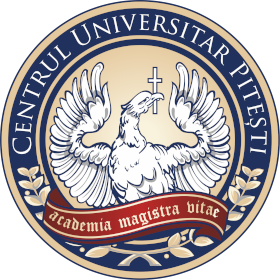- Faculties
- Faculty of Theology, Letters, History and Arts
- Department of Applied Foreign Languages
- Master’s degree programs
- Specialized Languages and Computer-Assisted Translation
Specialized Languages and Computer-Assisted Translation (SLCAT)
|
MISSION OF THE MASTER’S DEGREE PROGRAM |
SLCAT is an interdisciplinary master’s program addressed mainly to graduates with a degree in Applied Foreign Languages as well as in Language and Literature or other academic programs in the fundamental field of Humanities. It is also addressed to graduates holding a degree in International Relations, Journalism, or Engineering Studies that possess advanced technical and linguistic skills (a minimum B1 level according to the Common European Framework of Reference for Languages – CEFR). The training within the program in Specialized Languages and Computer-Assisted Translation is provided by teaching staff from the University of Pitesti (Faculty of Letters and the Faculty of Electronics, Telecommunications and Computer Engineering). The program has professional vocation and an interdisciplinary character, both theoretical and practical, offering training tailored to meet the needs of the socioeconomic environment, but it also opens scientific research opportunities for the students and graduates.
Through its curricula, which comprises immersion courses as well as advanced knowledge and synthesis courses, the master’s program in Specialized Languages and Computer-Assisted Translation (SLCAT) aims to: - develop high-level skills; - offer professional education and training and contribute to professional integration - create perspectives of personal development.
Through the specificity of its activities, the master’s program in Specialized Languages and Computer-Assisted Translation combines:
- the interdisciplinary didactic mission, as it conveys the knowledge necessary for specialization in the fields of specialized languages, translation and new technologies;
- the professional training mission, as it prepares the students to work with computer applications in linguistic data processing and analysis and specialized and multimedia translation;
- the scientific research mission, as it helps develop skills and abilities necessary for the approach of innovative themes in the field of language industries and their applications in the socioeconomic environment. |
|
OBJECTIVES
|
General objective:
Interdisciplinarity is well built into the structure of this program of study, which is based on the acquisition of the new computer skills used for natural language processing as well as on the acquisition of skills used in the field of specialized and multimedia translation. These skills will be practised during the specialized training performed within the partnership agreements with the socioeconomic environment (institutions, bodies, small and medium-sized companies).
Specific objectives for professional training:
- acquiring advanced knowledge of professional and specialized languages (English and French); - mastering multilingual language management tools; - acquiring techniques and tools for computer applications in linguistic data processing and analysis; - mastering computer-assisted translation (CAT) tools and translation memories; - improving specialized and multimedia translation skills; - training for lexicographic activities (creating specialized dictionaries); - acquiring quality standards in the field of translation and specialized terminology.
Academic parteners for computer-assisted translation and localization: SDL Trados, Phrase
|
|
PROFESSIONAL SKILLS
|
The specific objectives of the master’s program in Specialized Languages and Computer-Assisted Translation lead to the acquisition of the following professional and transversal skills: Professional competences: C1. Translate different types of texts: Comprehend the nature of the type of text to be translated, for example commercial and industrial documentation, personal documents, journalism, novels, creative writing, certificates, government documentation, and scientific texts. C2. Translate texts: Translate text from one language to another, conserving the meaning and the nuances of the original text, without adding, changing or omitting anything and avoiding the expression of personal feelings and opinions. C3. Develop a translation strategy: Perform research to better understand a translation issue and develop the translation strategy that would remediate the encountered problems. C4. Review translation works: Read thoroughly translated works in order to ensure accuracy and achievement of the purpose. C5. Use localisation tools: employ a variety of translation tools aimed at helping the localisation and adaptation processes for translation works. C6. Use computer-aided translation: Operate computer-aided translation (CAT) software to facilitate the language translation processes. C7. Follow an ethical code of conduct for translation activities: Carry out translation activities according to accepted principles of right and wrong. This includes fairness, transparency, and impartiality. Do not use judgement or allow personal opinions to affect the quality of the translation or interpretation. C8. follow interpreting quality standards: Follow the agreed upon standards to ensure that the requirements for interpreters are met and to guarantee unity. This may include such standards as the European standard EN 15038 and ISO 17100 for translation. Transversal competences: Transversal competences: CT1. Manage quality: Pursue excellence in workplace processes, products and activities. CT2 Meet commitments: Perform one's tasks in a self-disciplined, reliable and goal-oriented manner.
|
|
TRANSVERSAL SKILLS
|
The specific objectives of the master’s program in Specialized Languages and Computer-Assisted Translation lead to the acquisition of the following professional and transversal skills: - CT.1 Acquire interdisciplinary research skills, develop their innovative spirit and holistic thinking - CT.2 Develop their sense of initiative, power of persuasion as well as their individual and group organizational skills - CT.3 Evaluate correctly their own level of performance so as to establish their professional training needs and the potential research directions in agreement with their own aspirations for professional development (doctoral studies, advanced specialization in niche domains etc.).
|
|
PROFESSIONAL EMPLOYMENT
|
The program prepares specialists for the following well-established qualifications in the Romanian and European area: - specialized translator (tehnical, scientific, economic and legal translations); - specialized multimedia translator: software localization, subtitling, creation of multilingual websites, website translation); - reviser-linguist; - terminologist; - documentalist ; - technical editor for foreign language documents; - editor- proofreader; - superviser/ coordinator of translation projects; - coordinator of terminological databases; - linguistic engineer specialized in designing, building, exploiting and maintaining linguistic software; - multilingual engineer, expert in translation technologies; - linguist-computer technician specialized in multilingual applications; - specialist in computer-assisted translation.
|
|
ADMISSION |
FILE-BASED ADMISSION more details
|








